The HyperTexts
Philippines Typhoon Haiyan Poetry and Art
This is a page of poems and art in sympathy with the victims of the monstrous
cyclone that devastated the Philippines in November 2013. Super Typhoon Haiyan, also
known as Yolanda, arrived with 200-mph winds and huge waves, killing more than
6,000 people and affecting over 11 million souls. Our prayers and well wishes are with
all Filipinos, and we
encourage our readers to donate money and time, as they are able, to the ongoing relief efforts.
Other super typhoons that have struck the Philippines since 2013 include Bopha/Pablo
and Rammasun/Glenda.
We have included a number of poems by
Oriental poets, including the master Basho, Takaha Shugyo, Chiyo-ni and Hiroshima survivors Takashi
Tanemori and Kurihara Sadako. All art on this page is by Takashi Tanemori. We have also included poems about crisis, death, suffering and
grief from poets around the globe, including Nadia Anjuman (Afghani), William Blake (English), Mahmoud Darwish (Palestinian), Emily Dickinson
(American), Tom Merrill (an American citizen now living in Canada), Leonard Nimoy (Jewish American) and Jalaluddin Rumi (Persian).
compiled by Michael R. Burch,
an editor
and publisher of Holocaust and Nakba poetry
Plea
by Leslie Mellichamp
O singer, sing to me—
I know the world's awry—
I know how piteously
The hungry children cry—
But I bleed warm and near,
And come another dawn
The world will still be here
When home and hearth are gone.
Come Lord and Lift
by T. Merrill
Come Lord, and lift the fallen bird
Abandoned on the ground;
The soul bereft and longing so
To have the lost be found.
The heart that cries—let it but hear
Its sweet love answering,
Or out of ether one faint note
Of living comfort wring.
Epitaph for a Filipino Child
by Michael R. Burch
I lived as best I could, and then I died.
Be careful where you step: the grave is wide.
Oh, fallen camellias,
if I were you,
I'd leap into the torrent!
― Takaha Shugyo, translated by Michael R. Burch
Our life here on earth:
to what shall we compare it?
It is not like a rowboat
departing at daybreak,
leaving no trace of us in its wake?
― Takaha Shugyo, translated by Michael R. Burch
What indeed is Earth but a Nest
from whose rim we are all falling?
—Emily Dickinson
Which plunderer’s hand
ransacked the pure gold statute of your dreams
In this horrendous storm?
—Nadia Anjuman, Afghani poet
I have torn speech like a tattered robe and let words go;
you who are still dressed in your clothes, sleep on.
—Jalaluddin Rumi, translated by Jack Marshall
The butterfly
perfuming its wings
fans the orchid
— Matsuo Basho, translated by
Michael R. Burch
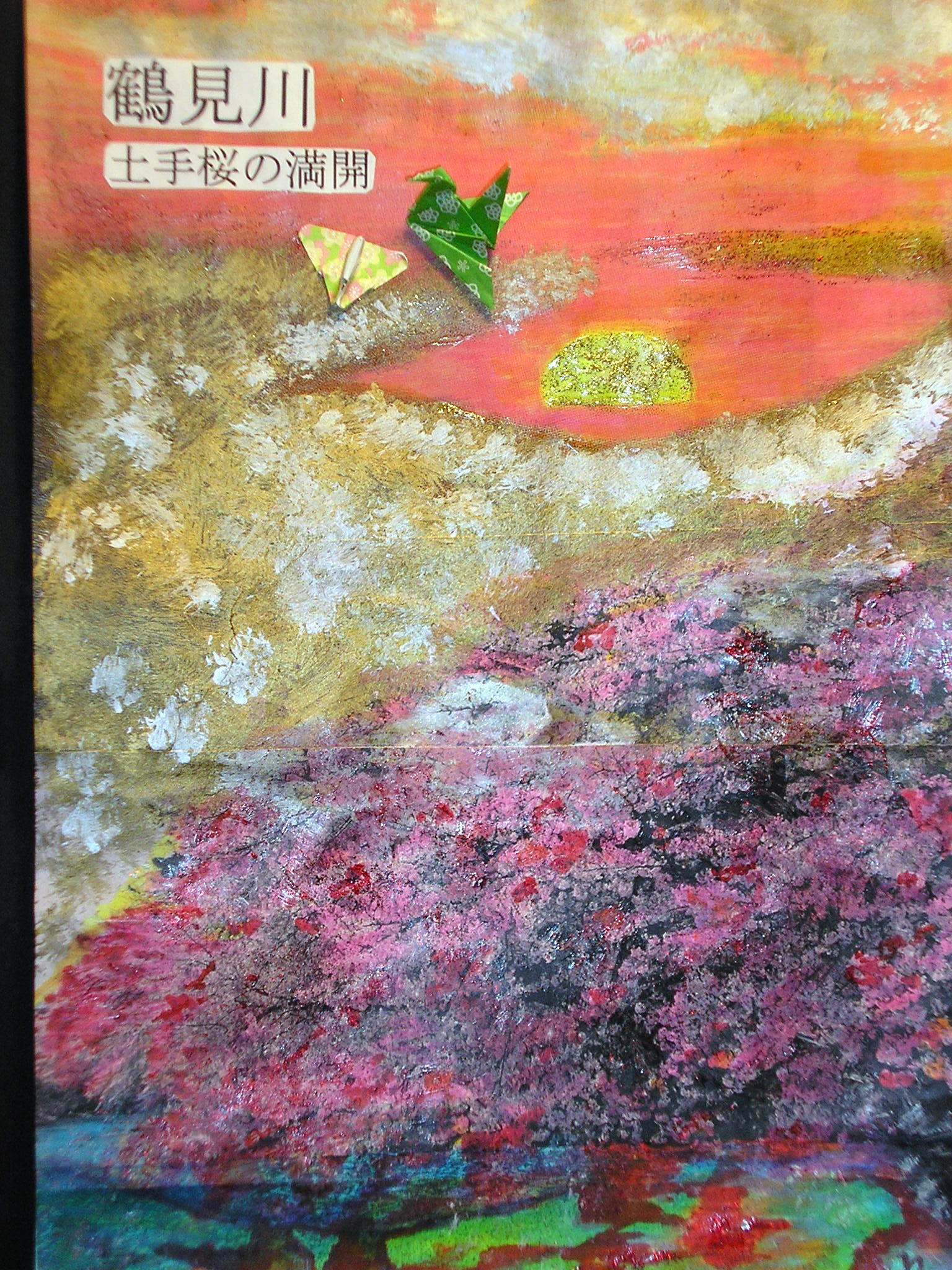
For a Child of the Philippines, with Butterflies
by Michael R. Burch
Where does the butterfly go
when lightning rails, when thunder howls,
when hailstones scream, when winter scowls
and storms compound dark frosts with snow?
Where does the butterfly go?
Where does the rose hide its bloom
when night descends oblique and chill
beyond the capacity of moonlight to fill?
When the only relief's a banked fire's glow,
where does the butterfly go?
And where shall the spirit flee
when life is harsh, too harsh to face,
and hope is lost without a trace?
Oh, when the light of life runs low,
where does the butterfly go?
Please tell me, dear child;
lead, oh, and I'll follow,
for surely, my Angel, you know ...
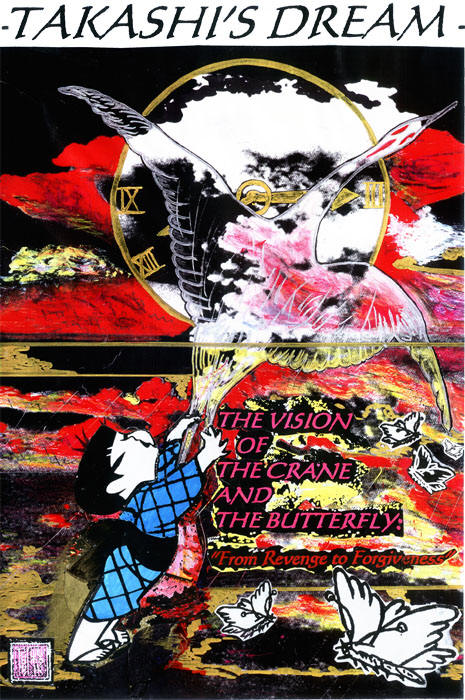
Will we remain parted forever?
Here at your grave:
two flowerlike butterflies!
― Matsuo Basho, translated by Michael R. Burch
Ah butterfly,
what dreams do you ply
with your beautiful wings?
― Chiyo-ni, translated by Michael R. Burch
Oh, dreamlike winter butterfly:
a puff of white snow
cresting mountains ...
― Kakio Tomizawa, translated by Michael R. Burch
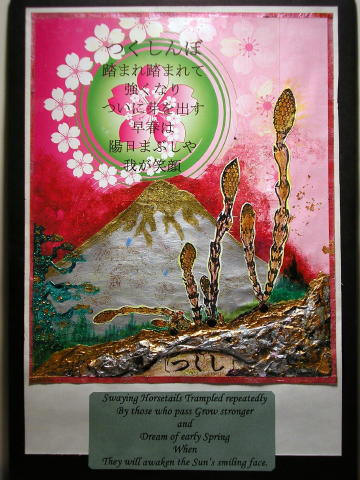
Grasses wilt:
the braking locomotive
grinds to a halt
― Yamaguchi Seishi, translated by Michael R. Burch
The Blade of Grass in a Dreamless Field
by Hiroshima survivor Takashi Tanemori
Only a few knew it existed;
No one knew its power;
The world would never be the same again,
Changing irrevocably and forever.
The six-hundred-year history of Hiroshima
Disappeared in the ashes,
On this Judgment Day, on this Morning!
(i)
Blameless souls forever vanish
on this morning, this judgment day.
Our silent cries, to heaven we appeal,
scattered like the ash of withered leaves.
Our ebbing souls
cling to that lonely sky;
we try in vain to escape this sea of flame.
Oh, Hiroshima, once my haven,
why has your life been sacrificed?
(ii)
The abounding sadness within my heart . . .
drowning my loneliness in tears of self-pity.
Four abandoned children;
wishing to feel our mother's love,
just once more;
if only in our dreams.
The heat of yet another long night lingers.
Oh, Hiroshima, once my home,
my tears run dry waiting for the breaking dawn.
(iii)
My soul is torn by this rage inside,
an orphan of war;
why does this make me feel guilty?
Why do my neighbors turn away
or, close their ears when I speak?
Bitterness poisons this innocent child,
I madly waste away.
Oh, Hiroshima, once my cradle,
I am waiting to die.
(iv)
Gathering remnants of my courage,
I stand alone in this notorious America, land of the enemy.
An outcast with slanted eyes,
I fall before the indifference of strangers;
sightlessly, they trample upon my dignity.
This life of anguish seems to be my destiny.
Praying for death, I endure time.
Oh, Hiroshima, once my comfort,
I am lost in dreams of revenge.
(v)
Budding leaves renew this tired place, this tired soul;
gently the rain is embraced by your love,
comforting this savaged heart.
A blade of grass emerges from the ashes,
and my heart becomes a light,
connecting me to heaven.
Living for one another, this is my path!
Oh Hiroshima, forever my love,
may my life become a bridge from you and others.
(vi)
At the dawn of the 21st century,
we honor this passage through darkness.
We must have the courage to enter
the void again . . . and again,
emerging with the gift of new life.
Healing only comes through learning to forgive
and making peace with our past.
Only then, will the wind whisper:
"Hibakusha, you have not lived in vain!"
O Krishna, son of Devaki,
Lord of the universe, of inexhaustible powers,
Krishna of the blue-lotus skin,
Krishna of the white-lily eyes,
Saffron-robed Krishna,
Help me now!
—Draupadi's cry to Krishna in Book Three The Forest (P. Lal)
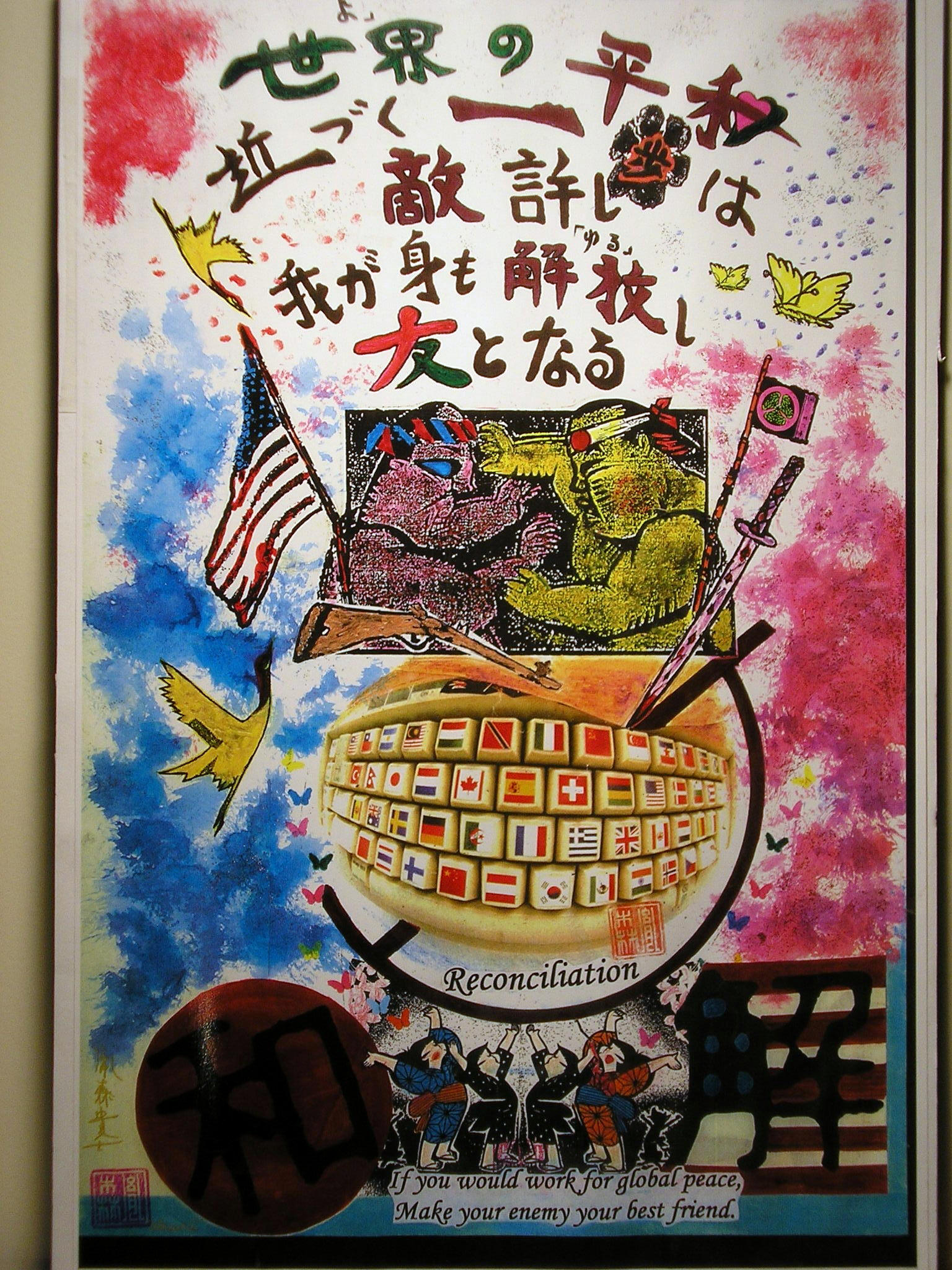
Seeing Your great form [Shiva, Death]
with many faces, many eyes, many arms, many thighs and feet,
and many terrible tusks and stomachs,
O Mighty Armed,
the worlds are terrified and so am I.
—Bhagavad-Gita
See: whose surviving sons
visit the ancestral graves
white-bearded, with trembling canes?
― Matsuo Basho, translated by Michael R. Burch
Deep autumn:
my neighbor,
how does he live, I wonder ...
― Matsuo Basho, translated by Michael R. Burch
Excerpts from "Under Siege"
by Mahmoud Darwish
translated by Marjolijn De Jager
Here on the slopes of hills, facing the dusk and the cannon of time
Close to the gardens of broken shadows,
We do what prisoners do,
And what the jobless do:
We cultivate hope ...
A country preparing for dawn ...
Here there is no "I".
Here Adam remembers the dust of his clay.
When the planes disappear, the white, white doves
Fly off and wash the cheeks of heaven
With unbound wings taking radiance back again, taking possession
Of the ether and of play. Higher, higher still, the white, white doves
Fly off. Ah, if only the sky
Were real ...
Alone, we are alone as far down as the sediment
Were it not for the visits of the rainbows ...
A little of this absolute and blue infinity
Would be enough
To lighten the burden of these times
And to cleanse the mire of this place.
Resisting means assuring oneself of the heart’s health,
The health of the testicles and of your tenacious disease:
The disease of hope.
Greetings to the one who shares with me an attention to
The drunkenness of light, the light of the butterfly, in the
Blackness of this tunnel!
Greetings to the one who shares my glass with me
In the denseness of a night outflanking the two spaces:
Greetings to my apparition.
My friends are always preparing a farewell feast for me,
A soothing grave in the shade of oak trees
A marble epitaph of time
And always I anticipate them at the funeral:
Who then has died ... who?
Ring the bells that still can ring
Forget your perfect offering
There is a crack in everything
That's how the light gets in.
—Leonard Cohen
I took one Draught of Life—
I'll tell you what I paid—
Precisely an existence—
The market price, they said.
—Emily Dickinson
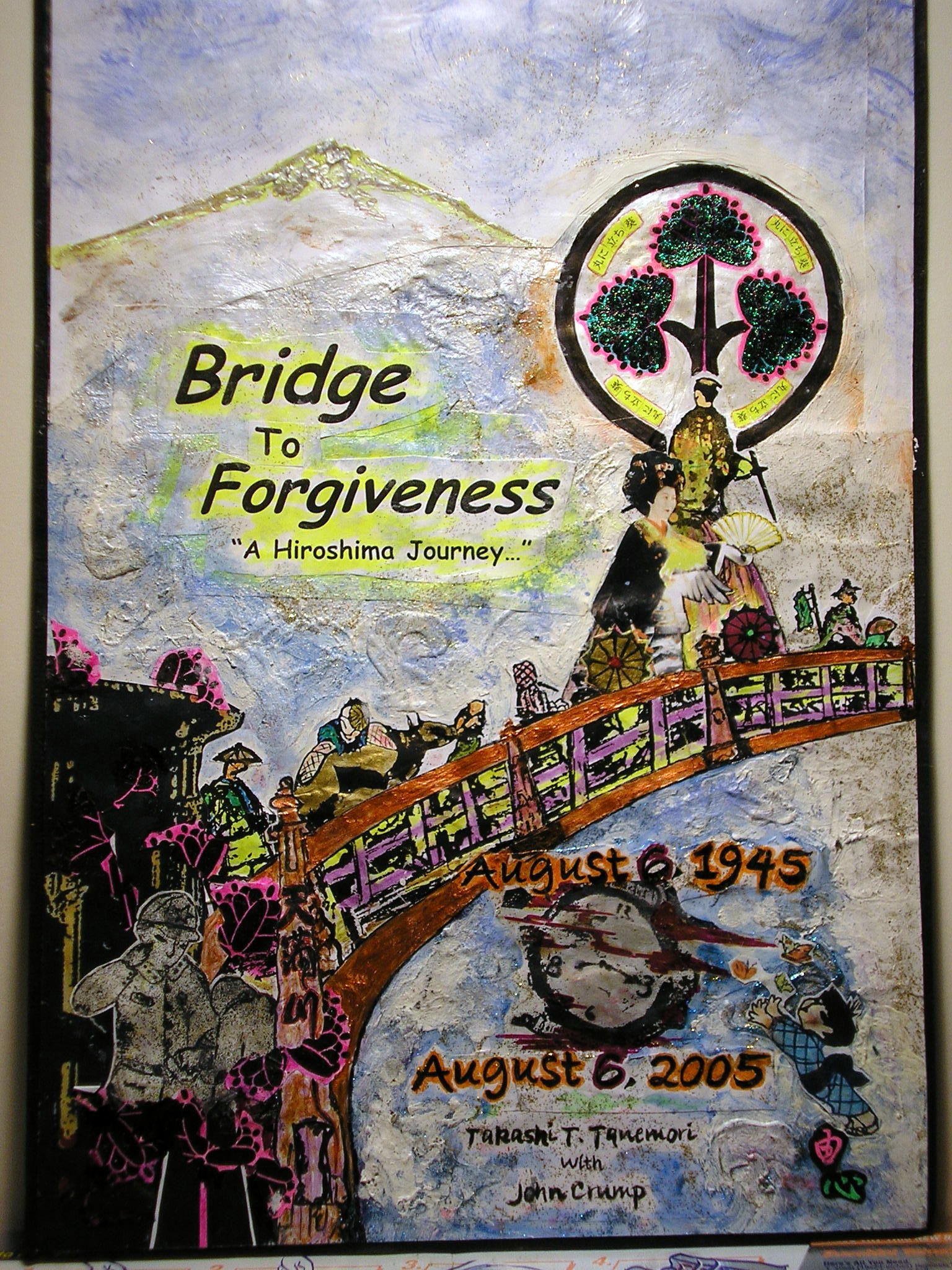
But what am I?
An infant crying in the night:
An infant crying for the light:
And with no language but a cry.
—Alfred, Lord Tennyson
Let Us Be Midwives!
by Hiroshima survivor Kurihara Sadako
translated by
Michael R. Burch
Midnight . . .
the basement of a shattered building . . .
atomic bomb survivors sniveling in the darkness . . .
not a single candle between them . . .
the odor of blood . . .
the stench of death . . .
the sickly-sweet smell of decaying humanity . . .
the groans . . .
the moans . . .
Out of all that, suddenly, miraculously, a voice:
"The baby's coming!"
In the hellish basement, unexpectedly,
a young mother had gone into labor.
In the dark, lacking a single match, what to do?
Scrambling to her side,
forgetting their own . . .
Let us arrange
these lovely flowers in the bowl
since there's no rice
― Matsuo Basho, translated by Michael R. Burch
Do Not Go Gentle Into That Good Night
by
Dylan Thomas
Do not go gentle into that good night,
Old age should burn and rave at close of day;
Rage, rage against the dying of the light.
Though wise men at their end know dark is right,
Because their words had forked no lightning they
Do not go gentle into that good night.
Good men, the last wave by, crying how bright
Their frail deeds might have danced in a green bay,
Rage, rage against the dying of the light.
Wild men who caught and sang the sun in flight,
And learn, too late, they grieved it on its way,
Do not go gentle into that good night.
Grave men, near death, who see with blinding sight
Blind eyes could blaze like meteors and be gay,
Rage, rage against the dying of the light.
And you, my father, there on the sad height,
Curse, bless, me now with your fierce tears, I pray.
Do not go gentle into that good night.
Rage, rage against the dying of the light.
Come, investigate loneliness!
a solitary leaf
clings to the Kiri tree
― Matsuo Basho, translated by Michael R. Burch
Towers
by
Leslie Mellichamp
Proudly flash our towers in the sun,
Temples earth has never felt before;
Intricate, aloof—no taint of soil
Desecrates a polished corridor.
Doubtless we will build them to the end,
Forgetting or ignoring that their stem
Rests only upon earth. An earth that may
But shudder in its dream and swallow them.
Whistle on, twilight whippoorwill,
solemn evangelist
of loneliness
― Matsuo Basho, translated by Michael R. Burch
Neglect
by Michael R. Burch
What good are your tears?
They will not spare the dying their anguish.
What good is your concern
to a child sick of living, waiting to perish?
What good, the warm benevolence of tears
without action?
What help, the eloquence of prayers,
or a pleasant benediction?
Before this day is gone,
how many more will die
with bellies swollen, wasted limbs,
and eyes too parched to cry?
I fear for our souls
as I hear the faint lament
of their souls departing ...
mournful, and distant.
How pitiful our "effort,"
yet how fatal its effect.
If they died, then surely we killed them,
if only with neglect.
An empty road
lonelier than abandonment:
this autumn evening
― Matsuo Basho, translated by Michael R. Burch
I Pray Tonight
by Michael R. Burch
I pray tonight
the starry light
might
surround you.
I pray
by day
that, come what may,
no dark thing confound you.
I pray ere the morrow
an end to your sorrow.
May angels' white chorales
sing, and astound you.
I expect to pass this way but once;
any good therefore that I can do,
or any kindness that I can show to any fellow creature,
let me do it now.
Let me not defer or neglect it,
for I shall not pass this way again.
—Etienne Griellet
We live upon one another according
to the law, ancient and timeless.
Let us live thus in loving-kindness.
—Khalil Gibran
... go my friend, bestow your love
even on your enemies
if you touch their hearts
what do you think will happen ...
—Jalaluddin Rumi, translated by Nader Khalili
I am convinced
That if all mankind
Could only gather together
In one circle
Arms around each other's shoulders
And dance, laugh and cry
Together
Then much
of the tension and burden
of life
Would fall away
In the knowledge that
We are all children
Needing and wanting
Each other's
Comfort and
Understanding
We are all children
Searching for love
—Leonard
Nimoy
Spring has come:
the nameless hill
lies shrouded in mist
― Matsuo Basho, translated by Michael R. Burch
Withered Roses
by Allama Iqbāl
loose translation by
Michael R. Burch
What can I call you,
but the nightingale's desire?
The morning breeze was your nativity,
an afternoon garden, your sepulcher.
My tears welled up like dew,
till in my abandoned heart your rune grew,
this dream-emblem of love:
this spray of withered roses.
A kite floats
at the same place in the sky
where yesterday it floated ...
― Buson Yosa, translated by Michael R. Burch
Cradle Song
by William Blake
Sleep, sleep, beauty bright,
Dreaming in the joys of night;
Sleep, sleep; in thy sleep
Little sorrows sit and weep.
Sweet babe, in thy face
Soft desires I can trace,
Secret joys and secret smiles,
Little pretty infant wiles.
As thy softest limbs I feel
Smiles as of the morning steal
O'er thy cheek, and o'er thy breast
Where thy little heart doth rest.
O the cunning wiles that creep
In thy little heart asleep!
When thy little heart doth wake,
Then the dreadful night shall break.
We cannot see the moon
and yet the waves still rise
― Shiki Masaoka, translated by Michael R. Burch
You Who Read No Calm
by T. Merrill
You, who read no calm reportings
Of alien, distant, dire events,
But shriek and keen as loves go down
Beyond all help, to violence;
Whose temple's walls, stormstruck and split
By sizzling bolts collapse around,
While mid the crash of chaos hope
Whirls in a death-spin to the ground;
You, who alone in deep distress
Cry out for help where there is none,
All you whom I shall never know:
I know a portion nonetheless
Of cruel trials you undergo.
Killers in many guises come:
Sudden as electric shock
Or looming ghostly as a shark
Leisurely finning toward its mark.
I who breathless and sweating once
Wrestled a devil to the floor,
And saw him rise again when he
Finished what he began before,
I who re-learned each childhood prayer
Forgotten, to the stars once more
Send up a poor and hopeless plea
For spirit's peace beyond despair.
The new calendar!:
as if tomorrow
is assured ...
― Inahata Teiko, translated by Michael R. Burch
Exile
by Hart Crane
My hands have not touched pleasure since your hands,—
No,—nor my lips freed laughter since 'farewell',
And with the day, distance again expands
Voiceless between us, as an uncoiled shell.
Yet love endures, though starving and alone.
A dove's wings cling about my heart each night
With surging gentleness, and the blue stone
Set in the tryst-ring has but worn more bright.
Tonight I saw
how the peony crumples
in the fire's embers
― Katoh Shuhson, translated by Michael R. Burch
Fowles in the Frith (Anonymous Medieval English Lyric)
loose translation by
Michael R. Burch
The birds in the wood,
the fishes in the flood ...
and I must go mad:
much sorrow I walk with,
for beasts of bone and blood.
Death
stood at the end of the hall
in the long shadows
― Watanabe Hakusen, translated by Michael R. Burch
Bread and Music
by Conrad Aiken
Music I heard with you was more than music,
And bread I broke with you was more than bread;
Now that I am without you, all is desolate;
All that was once so beautiful is dead.
Your hands once touched this table and this silver,
And I have seen your fingers hold this glass.
These things do not remember you, belovèd,
And yet your touch upon them will not pass.
For it was in my heart you moved among them,
And blessed them with your hands and with your eyes;
And in my heart they will remember always,—
They knew you once, O beautiful and wise.
The bitter winter wind
ends here
with the frozen sea
― Ikenishi Gonsui, translated by Michael R. Burch
Song For The Last Act
by Louise Bogan
Now that I have your face by heart, I look
Less at its features than its darkening frame
Where quince and melon, yellow as young flame,
Lie with quilled dahlias and the shepherd's crook.
Beyond, a garden. There, in insolent ease
The lead and marble figures watch the show
Of yet another summer loath to go
Although the scythes hang in the apple trees.
Now that I have your face by heart, I look.
Now that I have your voice by heart, I read
In the black chords upon a dulling page
Music that is not meant for music's cage,
Whose emblems mix with words that shake and bleed.
The staves are shuttled over with a stark
Unprinted silence. In a double dream
I must spell out the storm, the running stream.
The beat's too swift. The notes shift in the dark.
Now that I have your voice by heart, I read.
Now that I have your heart by heart, I see
The wharves with their great ships and architraves;
The rigging and the cargo and the slaves
On a strange beach under a broken sky.
O not departure, but a voyage done!
The bales stand on the stone; the anchor weeps
Its red rust downward, and the long vine creeps
Beside the salt herb, in the lengthening sun.
Now that I have your heart by heart, I see.
Winter waves
roil
their own shadows
― Tominaga Fûsei, translated by Michael R. Burch
O, Little Root of a Dream
by Paul Celan
loose translation by
Michael R. Burch
O, little root of a dream
you enmire me here;
I’m undermined by blood —
no longer seen,
enslaved by death.
Touch the curve of my face,
that there may yet be an earthly language of ardor,
that someone else’s eyes
may see yet see me,
though I’m blind,
here where you
deny me voice.
No sky,
no land:
just snow eternally falling ...
― Kajiwara Hashin, translated by Michael R. Burch
You Were My Death
by Paul Celan
loose translation by
Michael R. Burch
You were my death;
I could hold you
when everything abandoned me —
even breath.
Uphill
by Christina Rossetti
Does the road wind up-hill all the way?
Yes, to the very end.
Will the day's journey take the whole long day?
From morn to night, my friend.
But is there for the night a resting-place?
A roof for when the slow dark hours begin.
May not the darkness hide it from my face?
You cannot miss that inn.
Shall I meet other wayfarers at night?
Those who have gone before.
Then must I knock, or call when just in sight?
They will not keep you standing at that door.
Shall I find comfort, travel-sore and weak?
Of labour you shall find the sum.
Will there be beds for me and all who seek?
Yea, beds for all who come.
When You Are Old
by William Butler Yeats
When you are old and grey and full of sleep,
And nodding by the fire, take down this book,
And slowly read, and dream of the soft look
Your eyes had once, and of their shadows deep;
How many loved your moments of glad grace,
And loved your beauty with love false or true,
But one man loved the pilgrim soul in you,
And loved the sorrows of your changing face;
And bending down beside the glowing bars,
Murmur, a little sadly, how Love fled
And paced upon the mountains overhead
And hid his face amid a crowd of stars.
Song
by Christina Rossetti
When I am dead, my dearest,
Sing no sad songs for me;
Plant thou no roses at my head,
Nor shady cypress tree:
Be the green grass above me
With showers and dewdrops wet;
And if thou wilt, remember,
And if thou wilt, forget.
I shall not see the shadows,
I shall not feel the rain;
I shall not hear the nightingale
Sing on, as if in pain:
And dreaming through the twilight
That doth not rise nor set,
Haply I may remember,
And haply may forget.
On My First Son
by Ben Jonson
Farewell, thou child of my right hand, and joy;
My sin was too much hope of thee, loved boy.
Seven years thou wert lent to me, and I thee pay,
Exacted by thy fate, on the just day.
O, could I lose all father now! For why
Will man lament the state he should envy?
To have so soon 'scaped world's and flesh's rage,
And, if no other misery, yet age?
Rest in soft peace, and asked, say, "Here doth lie
Ben Jonson his best piece of poetry,
For whose sake, henceforth, all his vows be such
As what he loves may never like too much."
The HyperTexts




